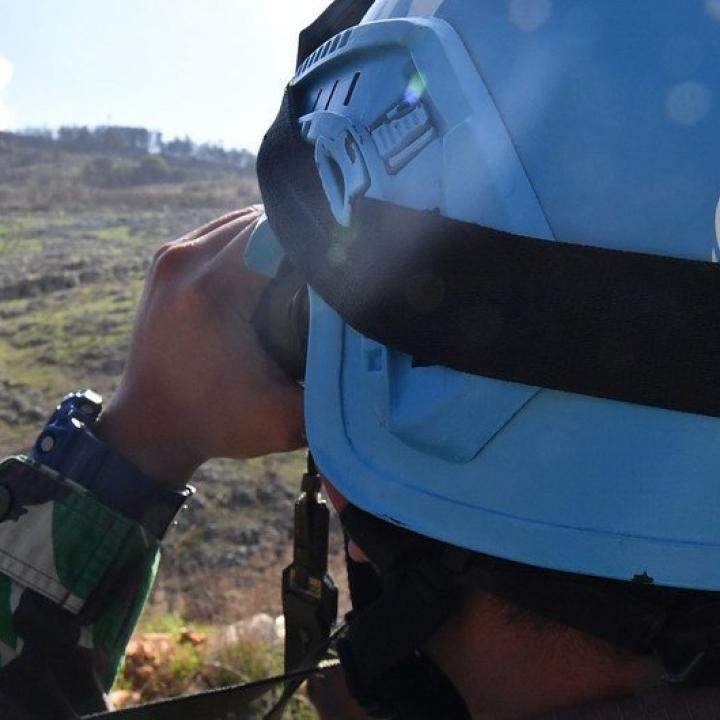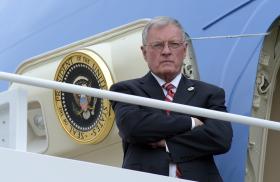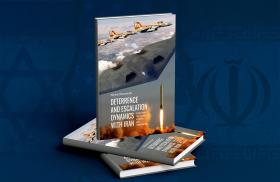
- Policy Analysis
- PolicyWatch 4044
UNIFIL’s Fork in the Road

The time for inertia is over—this summer, Security Council members will have a rare and urgent chance to break the spell of illusory “peacekeeping” and advance a model that actually helps keep the peace between Israel and Lebanon.
In August, Security Council members will once again debate renewing the mandate for the UN Interim Force in Lebanon (UNIFIL). Given the dramatic changes inside Lebanon, this discussion must not lead to just another unmodified extension that follows the well-worn path of diplomatic convenience, operational irrelevance, and strategic failure. The time has come for UNIFIL to either adapt or disband.
Months of War Produce a New Security Architecture
On October 8, 2023—one day after the Hamas-led massacre across the Gaza border—Hezbollah began its own campaign of large-scale attacks on Israel. The ensuing thirteen months of war devastated both sides of the Blue Line separating Israel and Lebanon, exposing UNIFIL’s limitations in the process. Then, Israel’s autumn 2024 offensive decimated Hezbollah’s personnel and armaments, leading to a November 27 ceasefire backed by a U.S.-led international monitoring and enforcement mechanism that included Israel, Lebanon, and France.
In early 2025, Lebanon’s newly elected president, Joseph Aoun, declared a government monopoly on arms as national policy. Afterward, with support from the enforcement mechanism and UNIFIL, the Lebanese Armed Forces (LAF) deployed to the south and began dismantling Hezbollah positions, apparently with the group’s tacit consent. Once Hezbollah’s near-border infrastructure was thoroughly destroyed, the Israel Defense Forces gradually withdrew from all but five outposts on Lebanon’s side of the frontier, though IDF air units continued to strike the group. About 170 Hezbollah members have been killed since the ceasefire; so far, the group has refrained from striking back. Lebanon also initiated the disarmament of local Palestinian militias through dialogue with the Palestinian Authority and Hamas. These developments have reshaped the security landscape and created rare momentum for enforcing UN Security Council Resolutions 1701 (2006) and 1559 (2004), which sought to reinforce Lebanese sovereignty by rolling back Hezbollah’s presence in the south and, ultimately, disarming militias nationwide.
The security regime established after the 2006 war relied on the Lebanese government and LAF to prevent another war with UNIFIL support. Over the years, however, Hezbollah rebuffed each of these actors and neutralized this system. The latest war has led to a new security architecture that once again leans on the LAF with backing from UNIFIL—but this time augmented by pivotal U.S. monitoring and aggressive Israeli military enforcement against Hezbollah violations.
Combining diplomatic efforts and U.S. Central Command leadership, the American role has energized the LAF and allowed for greatly enhanced Israeli-Lebanese communications, while UNIFIL’s role as a mediating force has been diminished. As of late April, the LAF reported that it had raided more than 500 Hezbollah positions and dismantled more than 90 percent of the group’s southern infrastructure. By mid-May, UNIFIL reported that peacekeepers had found more than 225 weapons caches and referred them to the LAF. Yet Israel is not buying the narrative of increased UNIFIL efficacy, concluding that any progress made by the organization has been negligible and that, in fact, the force is beyond repair.
Known Shortcomings, Strategic Alternatives
A chronic problem for UNIFIL is the strategic mismatch between its stated mission, mandate, size, and modus operandi. Even as Resolution 1701 expanded the force sixfold to compensate for the LAF’s capacity shortages at the time, Beirut and the UN lacked the political will to confront Hezbollah’s massive military deployments south of the Litani River. For years thereafter and until the present time, UNIFIL’s thousands of patrols proved futile—blocked from accessing sensitive areas and drawing harassment from Hezbollah and its supporters, who effectively operated with impunity. And despite having so many eyes on the ground, UNIFIL completely misrepresented Hezbollah’s vast buildup in the force’s area of responsibility, issuing reports that created a false impression of serious international monitoring, helped successive Lebanese governments evade their commitments, and masked the gathering storm.
When war broke out in October 2023, UNIFIL’s 10,000 peacekeepers remained in their positions to no perceivable benefit, serving instead as a shield for Hezbollah while endangering themselves and the IDF. Later, UNIFIL suspended all but critical supply missions, allowing it to express public pride in the dubious achievement of “staying throughout the conflict.” Yet testimonies of captured Hezbollah fighters indicate that the organization has bribed peacekeepers and used their positions and equipment against Israel.
Today, UNIFIL remains a generally ineffective entity with an inflated $500 million annual budget and bloated force size doing too little of value (epitomized by troops engaging in activities far outside their mandate, like vaccinating livestock). Even so, it has shown some mission-worthy elements over the years. Most important, it served as a liaison and helped mitigate friction between the LAF and IDF, particularly via the tripartite meetings it hosted after 2006 (though these ended during the latest war and were ultimately supplanted by the U.S.-led enforcement mechanism). UNIFIL also occasionally stepped in to prevent unwarranted escalation along the border before the war.
In light of this background, the Security Council’s mandate renewal discussions this August will boil down to three choices:
- Extend UNIFIL’s mandate unchanged: Beirut seems to prefer this route, and some permanent council members may endorse it, so this default option will once again win out unless the United States makes a determined diplomatic effort to revise or veto it. Yet continuing this broken approach would only perpetuate UNIFIL’s shortcomings and cost-ineffectiveness while ignoring its two decades of failure—and, crucially, missing new strategic opportunities created by the war.
- Forge a “UNIFIL 3.0”: By sharply realigning UNIFIL's mandate and structure, council members could optimize the force’s advantages in the new environment and its general effectiveness. Over the years, UNIFIL’s size has been as small as 2,000 troops before ballooning to a high of 12,500 during the “UNIFIL 2.0” era after the 2006 war, then settling to around 10,000. Today, it can be safely rightsized to 2,500 troops at most, with conditional adjustments made over time as needed. Some of the funds and resources saved by this approach could then be reallocated directly to the LAF. Such a course correction would require serious diplomatic heft but is well worth the effort given the potential strategic and operational benefits.
- End the mission: UNIFIL is, by definition, an interim force, and now that Lebanon’s government and army seem intent on assuming responsibility and implementing Resolution 1701, officials should seriously consider ending the mission altogether, as Israel is currently seeking to do. Even if Beirut fails to honor its commitments or Washington ends its role in the monitoring mechanism, UNIFIL’s absence would still have only a marginal impact, and alternatives could be found (e.g., using the UN Truce Supervision Organization’s observers and liaison capabilities).
Policy Recommendations
Because no military effort can permanently roll back Hezbollah without sufficient political space, the Lebanese government’s commitment to establishing and maintaining a monopoly on arms is indispensable to the success of any UN peacekeeping plans. The LAF is the cornerstone of Lebanon’s present and future security architecture, so it should take the lead while UNIFIL phases down. Member states should support Beirut and the LAF as long as they uphold their ceasefire commitments.
The default move of renewing UNIFIL’s mandate unchanged is no longer an option, as Israel will never accept a return to the pre-October 7 status quo along its northern border. Terminating UNIFIL’s mission altogether and diverting its resources to the LAF is perhaps the best option, but that may not be diplomatically feasible. Given the security realities on the ground and political realities at the UN, one possible way ahead is for the United States and Israel to push for the “UNIFIL 3.0” alternative, hopefully with support from France, Lebanon, and the United Kingdom.
If UNIFIL's mission continues, authorities need to make sure the following changes are implemented:
- The force’s mandate, size, and capabilities must be sharply realigned with a focus on mission-critical components, namely: command, control, and liaison functions; improved situational awareness inside Lebanon through a stronger military observer unit and an independent intelligence system with no local Lebanese members; a quick reaction force (up to two battalions); a small security force; and useful professional units (e.g., explosive ordnance disposal teams) as long as they are needed.
- The Lebanese government must officially demand that UNIFIL implement Resolution 1701 and the current ceasefire agreement by proactively and independently preventing nongovernmental entities from possessing or using weapons in south Lebanon. This would support Beirut’s wider effort to disarm Hezbollah throughout the entire country per Resolution 1559.
- Lebanon must enforce UNIFIL’s freedom of access to any relevant location, removing all existing restrictions that have prevented the force from entering or even monitoring many Hezbollah sites (e.g., LAF-defined “private properties,” “narrow roads,” and “areas of strategic importance”). This means authorizing joint UNIFIL-LAF inspections in areas of high interest as well as unaccompanied UNIFIL patrols to independently destroy prohibited weapons when found.
- Lebanon must fulfill its duty as a host country by quickly apprehending and prosecuting suspects who attack UNIFIL personnel, putting an end to years of delayed justice in response to Hezbollah harassment and violence.
- UNIFIL’s mandate, size, and missions should be reviewed every six months instead of once a year, enabling officials to better adjust it based on shifting realities in Lebanon.
- UN reporting must increase in quality and frequency to faithfully reflect the situation on the ground, detailing UNIFIL’s real operational footprint and the exact places where it has been denied access. Greater use of professional military observers should be a priority, emphasizing systematic visual, geographical, and data-driven reporting.
- The effective, proactive U.S. role in shaping the new security environment should be maintained.
- Israel, not UNIFIL, should continue to serve as the military backstop for enforcing the ceasefire, indirectly helping the Lebanese government on its road to sovereignty. Jerusalem could also help the new leadership gain traction by releasing some Lebanese prisoners and considering the gradual handover of remaining cross-border outposts if Beirut provides strong guarantees that it will never again threaten Israel.
Alongside these changes, Israel should join with Washington in exploring the next steps in its bilateral relations with Lebanon, including border talks, more robust security arrangements, a permanent ceasefire, and the bright horizon of a formal, lasting peace. Yet this will require breaking with past practice and shaping a UN peacekeeping force that is fit for purpose. The profound changes in Lebanon have made the political, operational, and financial costs of preserving an oversized, ineffective mission unsustainable. The UNIFIL 3.0 alternative offers a pragmatic path forward: leaner, smarter, and more integrated with the new ceasefire mechanism. Getting there will require political will, coordinated diplomacy, and a readiness to block another default renewal or, if necessary, end the mission.
Brig. Gen. Assaf Orion, IDF (Res.), is The Washington Institute’s Rueven International Fellow, a senior research fellow at the INSS, and former head of the IDF Strategic Planning Division, where he led the liaison with UNIFIL and the LAF.



